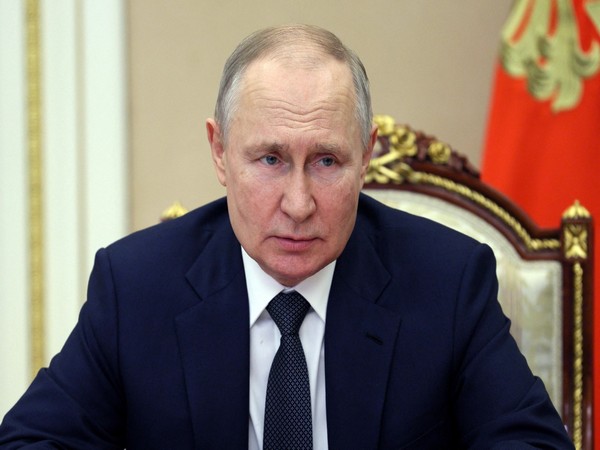
President Putin warns about the Hamas-Israel conflict, President Biden proposes solutions
Oct 26, 2023
Moscow [Russia], October 26: On October 25, the United Nations Security Council failed to pass two different draft resolutions on the Hamas-Israel conflict proposed by the US and Russia respectively.
The Israel Defense Forces (IDF) announced today, October 26, that the country's air defense systems intercepted a surface-to-air missile launched from Lebanon at an Israeli military drone (UAV), according to the newspaper . The Times of Israel . The UAV did not appear to be damaged in this incident.
The IDF also announced that an Israeli fighter jet attacked a missile launch site in southern Lebanon. There is currently no information about Lebanon's reaction.
Israel has been fighting Hezbollah in Lebanon and soldiers in Syria in recent days, a broader conflict on Israel's northern border as the Hamas-Israel conflict continues.
President Putin issued a warning
Russian President Vladimir Putin warned on October 25 that the Hamas-Israel conflict could spread beyond the Middle East and said it was wrong for innocent women, children and elderly people in Gaza to be punished for their crimes . other, according to Reuters.
President Putin emphasized that bloodshed in the region must stop. The Russian leader said he told other world leaders in phone calls that if he did not do so, there would be a risk of widespread conflict.
"Our task today, our primary task, is to stop the bloodshed and violence. Otherwise, the escalation of this crisis will have serious, extremely dangerous and catastrophic... The conflict could spread beyond the borders of the Middle East," President Putin warned during a meeting in the Kremlin with Russian religious leaders.
President Putin also emphasized that Moscow continues to support the two-state solution to the Palestinian-Israeli issue, believing that this is the only way to achieve a lasting solution.
However, Mr. Putin said he thought Israel was wrong to repeatedly bomb Gaza in retaliation for Hamas' attack on October 7. "We also clearly see that innocent people are not responsible for crimes committed by others," Mr. Putin emphasized.
Israel said the October 7 attack by Hamas left at least 1,400 people dead and more than 220 people taken hostage. The Health Authority in Gaza, run by Hamas, said Israel's retaliatory air strikes had killed more than 6,500 people, according to Reuters.
President Biden mentioned "the path towards peace"
During a joint press conference with Australian Prime Minister Anthony Albanese at the White House on October 25, US President Joe Biden emphasized that US support for Israeli defense is solid, but the parties need to think about the way forward in the future. area after the Gaza crisis is resolved.
"When this crisis is over, there needs to be a vision of what comes next. And in our view, it has to be a two-state solution. That means a focused effort from all parties, including Israel, Palestine, regional partners and global leaders, to put us on the path towards peace," President Biden emphasized.
President Biden added that he believes that one reason why Hamas attacked southern Israel on October 7 was to prevent the normalization of relations between Israel and Saudi Arabia.
Also at the above press conference, Prime Minister Albanese said Australia would provide an additional $15 million in aid to Gaza civilians, according to Reuters.
Previously, Australian Defense Minister Richard Marles said on October 25 that the country had deployed two more military aircraft and a "significant number" of defense personnel to the Middle East to support Australian citizens there in the event of a conflict. The Hamas-Israel conflict escalated.
Russia and China vetoed the draft resolution led by the US
Russia and China on October 25 vetoed the United States' push for the United Nations Security Council to act in the Hamas-Israel conflict by calling for a halt to fighting to allow access to humanitarian aid and protect civilians. normal and stop supplying weapons to Hamas and other armed groups in the Gaza Strip, according to Reuters.
The US introduced a draft resolution on October 21 as international outcry grew over the worsening humanitarian crisis and rising civilian deaths in Gaza. The US made this move just a few days after vetoing a humanitarian-focused draft put forward by Brazil, saying more time was needed for US-led diplomacy.
The initial US document shocked many diplomats because it bluntly stated that Israel has the right to self-defense and demanded that Iran stop exporting weapons to militia groups in Gaza. The text did not initially include a call for a humanitarian pause to aid aid to civilians in Gaza.
"We have listened to all of you," US Ambassador to the United Nations Linda Thomas-Greenfield told the 15-member UN Security Council after the vote. backward, but we must not be discouraged."
Meanwhile, Chinese Ambassador to the United Nations Truong Quan told the UN Security Council after the vote: "The draft does not reflect the world's strongest call for a ceasefire and an end to fighting." "And it doesn't help solve the problem. At this point, ceasefire is not just a diplomatic term. It means the lives and deaths of many civilians."
Russian Ambassador to the United Nations VassilyNebenzia accused the United States of presenting a draft resolution that represents Security Council authorization for Israel to launch a ground attack on Gaza "while thousands of Palestinian children will continue to die."
The Security Council then voted on a draft resolution drafted by Russia calling for a humanitarian ceasefire and withdrawing an Israeli order for civilians in northern Gaza to move south ahead of an attack. on set.
Russia's draft failed to achieve the required minimum amount of support, winning only 4 votes. A draft resolution needs at least 9 votes in favor and no veto from the US, France, UK, Russia or China to pass.
Faced with the deadlock of the Security Council, the 193-member United Nations General Assembly will vote on October 27 on a draft resolution put forward by Arab countries calling for a ceasefire. No country has veto power in the United Nations General Assembly. Resolutions passed by the United Nations General Assembly are not binding but have political weight, according to Reuters.
Source: ThanhNien Newspaper









